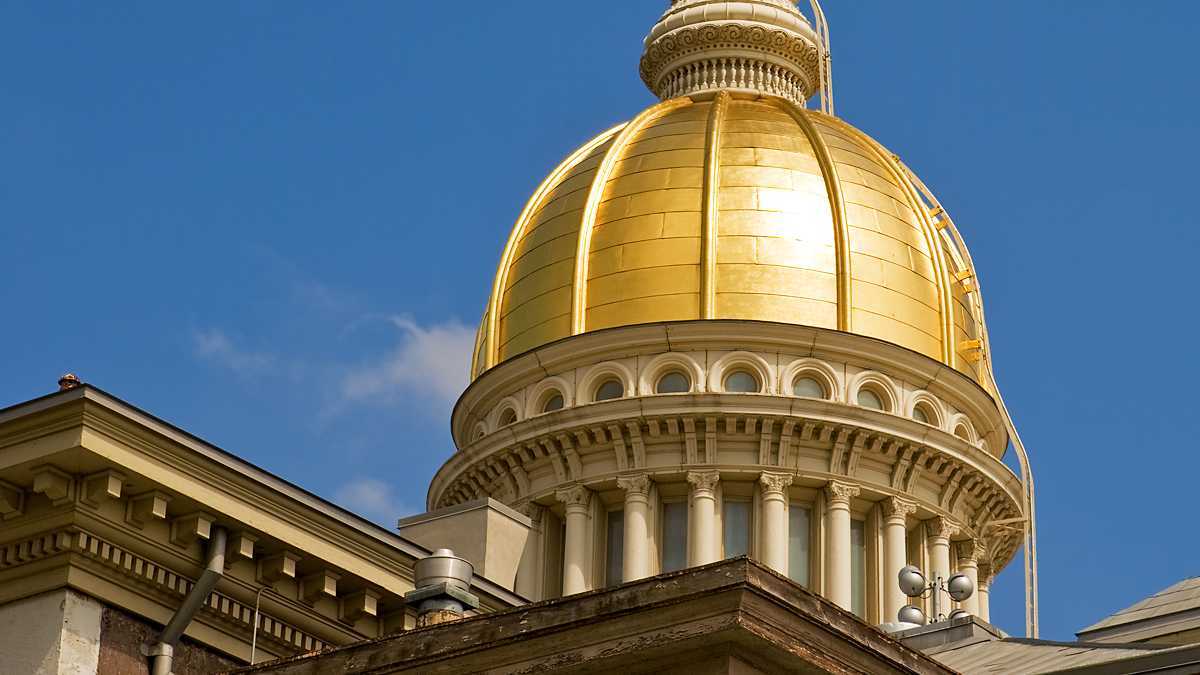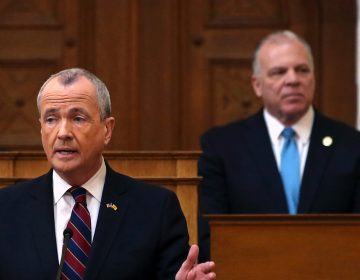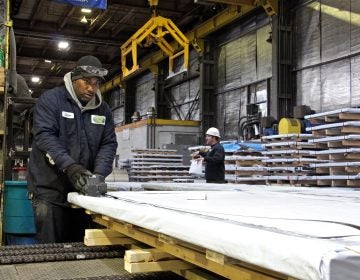New Jersey thinks now might be the time to raise corporate taxes
New Jersey Senate President Steve Sweeney has put forward a proposal that would have the state’s highest-earning corporations staring at a tax hike.
Listen 4:39
N.J. State Capitol dome in Trenton (AP, file)
New Jersey Senate President Steve Sweeney has yet to share Gov. Phil Murphy’s enthusiasm this year for increasing taxes on the state’s millionaires, but on Tuesday he put forward a proposal that would have the state’s highest-earning corporations staring at a tax hike.
Sweeney (D-Gloucester) said businesses are now getting a huge tax break from the federal government, thanks to a series of policy changes enacted late last year by President Donald Trump. Under the Senate president’s plan, New Jersey could capture a slice of that windfall to boost state spending on K-12 education.
The specifics of his proposal call for New Jersey’s top-end corporate-tax rate to increase from 9 percent to 12 percent for businesses earning more than $1 million. The Senate leader believes the state could collect as much as $657 million under the policy change, and he wants to use the revenue to boost state funding for special education, public preschool, and other education purposes. Spending on open-space preservation programs would also get a lift, because a portion of the state’s corporate-tax revenue is already constitutionally dedicated to those purposes.
Sweeney put forward his proposal just a week before Murphy is due to present his first state budget message to lawmakers in Trenton. Murphy, a fellow Democrat who has also prioritized K-12 education, is widely expected to incorporate revenue from a personal income-tax increase on earnings over $1 million into his budget proposal. Murphy campaigned on issues related to the economy and fiscal policy last year as a candidate, but this year Sweeney has been saying such a policy change should be a “last resort” given the state’s already high tax burden.
Murphy on Sweeney’s proposal
Asked by reporters about Sweeney’s corporate tax-hike proposal Tuesday, Murphy said it has “some appeal.” Meanwhile, Assembly Speaker Craig Coughlin (D-Middlesex) responded with a statement that indicated only that the proposal would be under consideration. Coughlin will play a key role going forward since the state Constitution says any legislation that increases revenue “shall originate” in the Assembly. For their part, Republicans and business groups raised immediate concerns about Sweeney’s proposal, with some GOP lawmakers lampooning the two Democratic leaders as being in the midst of a fight amongst themselves to determine which state tax should be raised.
“New Jersey does not need another tax increase making it harder to earn a living or run a business in our state,” said Assemblyman Anthony Bucco (R-Morris).
New Jersey’s corporate-business tax dates back to 1884, and the current version taxes corporate income under $50,000 at a 6.5 percent rate; between $50,000 and $100,000 at a 7.5 percent rate; and over $100,000 at a 9 percent rate. The current state budget calls for $2.34 billion to come in from the tax, a decent portion of an overall budget of $34.7 billion. But revenue from the tax, known in Trenton as the CBT, is traditionally volatile.
Under the proposal Sweeney outlined during a news conference in the State House this week, a new CBT top-end rate of 12 percent would be established for corporate income over $1 million. Sweeney suggested the highest-earning corporations have the most to gain from Trump’s federal tax overhaul, which reduced the federal corporate rate from 35 percent to 21 percent. He also said part of that tax cut is being financed by New Jersey residents who lost the ability to fully deduct state and local taxes from their federal taxable income. That deduction, known as SALT, is now capped at $10,000.
“Washington took really good care of corporations — at the expense of us,” Sweeney said. “It’s pretty simple. We’re looking at corporations that are going to have a windfall.”
Sweeney projects the higher corporate rate would bring in $657 million in new revenue, with $26 million going automatically to open-space preservation programs under a 2014 constitutional amendment. As part of the proposal, Sweeney would also repurpose $127 million in existing school-funding dollars to provide an overall boost of $277 million to districts that were considered “underfunded” by the Christie administration’s handling of the 2008 state school-aid formula.
Another $50 million would be used to pad a state grant program that funds public preschool programs. But the biggest chunk of the revenue haul, a total of $431 million, would be used to boost state spending on special education, which Sweeney said was identified by both Democrats and Republicans in recent policy hearings as a key area of need.
Pressed by reporters to explain the timing of his proposal and whether it should be viewed as being in competition with Murphy’s plan to increase taxes on millionaires, Sweeney said it isn’t an “alternative” proposal or negotiating chip.
“This isn’t me against him. This is myself, as the Senate president, looking at ways to find funding for our schools,” Sweeney said. “I think this is one (way) that does the least amount of damage to the state of New Jersey.”
Giving no ground on millionaire’s tax
Still, Governor Murphy has remained firmly dug in on the millionaire’s tax since taking office in January, and if he sticks with promises made during last year’s campaign, a new top-end personal-income tax rate of 10.75 percent would be established for earnings over $1 million. Right now, the state’s highest rate is 8.97 percent, and it is levied on earnings over $500,000.
Under Murphy’s proposal, the state would collect roughly $600 million in new revenue that could be used to increase spending on core priorities like K-12 education; Christie shorted the state’s school-funding law by as much as $2 billion annually. Murphy weighed in on Sweeney’s proposal yesterday after announcing preparations for an expected winter storm during an event in West Trenton.
“I think it’s got some appeal (and) we are engaging with the Senate president’s team,” Murphy said, before saying he needs to see more details.
“I don’t see it as an alternative (to the millionaire’s tax), perhaps as an additional weapon at our disposal,” he went on to say.
Meanwhile, Coughlin, the Assembly leader, issued a statement later in the day that seemed to indicate he has an interest in cutting spending.
“We will consider all ideas and work with the Senate and the governor’s office, as we continue to look for ways to reduce spending and better manage our existing resources,” the statement said.
But Sweeney’s proposal was widely embraced by Jeff Tittel, the director of the New Jersey Sierra Club. He said new revenue from the higher corporate rate in New Jersey could be used to offset federal funding cuts to environmental programs.
“This increase in funding will help us protect clean-water programs and clean up toxic sites that will suffer under Trump’s cuts,” Tittel said.
Business groups, however, raised concerns about where a 12 percent top-end corporate rate would leave New Jersey when it comes to competing against neighboring states to lure businesses. For example, New York and Connecticut already levy less aggressive corporate rates, and Pennsylvania’s top-end rate is just under 10 percent. In fact, only one other state, Iowa, currently levies a top-end corporate rate as high as 12 percent, according to state-by-state figures compiled by the Washington, D.C.-based Tax Foundation.
Michele Siekerka, the leader of the New Jersey Business & Industry Association, and Tom Bracken of the New Jersey Chamber of Commerce, pointed to the issue of regional competitiveness in a joint statement issued yesterday.
“The bottom line is New Jersey is already a high-tax state,” the two leaders said. “Raising taxes should not be the starting point for putting together a new budget.”
Democrats won’t need any votes in both houses of the Legislature to approve a higher corporate-tax rate because they have wide margins over Republicans, but it already appears unlikely that Sweeney’s corporate-tax proposal will be getting any GOP support.
“We need to hold the line on taxes and find smart opportunities to provide savings to taxpayers and increase New Jersey’s competitiveness,” said Senate Minority Leader Tom Kean Jr. (R-Union).
“Instead of fighting over how to make the state more affordable, the majority is fighting over which taxes to increase,” Bucco said.
__________________________________________
NJ Spotlight, an independent online news service on issues critical to New Jersey, makes its in-depth reporting available to WHYY.
WHYY is your source for fact-based, in-depth journalism and information. As a nonprofit organization, we rely on financial support from readers like you. Please give today.




